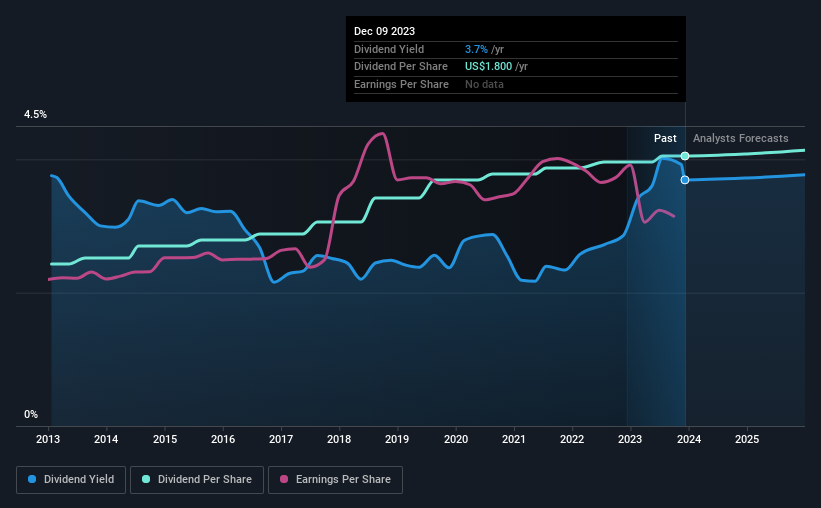Do These 3 Checks Before Buying Community Bank System, Inc. (NYSE:CBU) For Its Upcoming Dividend
Community Bank System, Inc. (NYSE:CBU) is about to trade ex-dividend in the next 4 days. The ex-dividend date occurs one day before the record date which is the day on which shareholders need to be on the company's books in order to receive a dividend. It is important to be aware of the ex-dividend date because any trade on the stock needs to have been settled on or before the record date. Meaning, you will need to purchase Community Bank System's shares before the 14th of December to receive the dividend, which will be paid on the 10th of January.
The company's upcoming dividend is US$0.45 a share, following on from the last 12 months, when the company distributed a total of US$1.80 per share to shareholders. Calculating the last year's worth of payments shows that Community Bank System has a trailing yield of 3.7% on the current share price of $48.76. Dividends are a major contributor to investment returns for long term holders, but only if the dividend continues to be paid. That's why we should always check whether the dividend payments appear sustainable, and if the company is growing.
Check out our latest analysis for Community Bank System
Dividends are usually paid out of company profits, so if a company pays out more than it earned then its dividend is usually at greater risk of being cut. Community Bank System paid out 63% of its earnings to investors last year, a normal payout level for most businesses.
When a company paid out less in dividends than it earned in profit, this generally suggests its dividend is affordable. The lower the % of its profit that it pays out, the greater the margin of safety for the dividend if the business enters a downturn.
Click here to see the company's payout ratio, plus analyst estimates of its future dividends.
Have Earnings And Dividends Been Growing?
Companies that aren't growing their earnings can still be valuable, but it is even more important to assess the sustainability of the dividend if it looks like the company will struggle to grow. If earnings fall far enough, the company could be forced to cut its dividend. That explains why we're not overly excited about Community Bank System's flat earnings over the past five years. It's better than seeing them drop, certainly, but over the long term, all of the best dividend stocks are able to meaningfully grow their earnings per share.
The main way most investors will assess a company's dividend prospects is by checking the historical rate of dividend growth. Since the start of our data, 10 years ago, Community Bank System has lifted its dividend by approximately 5.2% a year on average.
To Sum It Up
Is Community Bank System worth buying for its dividend? Community Bank System's earnings per share have been essentially flat, and the company is paying out more than half of its earnings as dividends to shareholders. This is not an overtly appealing combination of characteristics, and we're just not that interested in this company's dividend.
Wondering what the future holds for Community Bank System? See what the eight analysts we track are forecasting, with this visualisation of its historical and future estimated earnings and cash flow
A common investing mistake is buying the first interesting stock you see. Here you can find a full list of high-yield dividend stocks.
Have feedback on this article? Concerned about the content? Get in touch with us directly. Alternatively, email editorial-team (at) simplywallst.com.
This article by Simply Wall St is general in nature. We provide commentary based on historical data and analyst forecasts only using an unbiased methodology and our articles are not intended to be financial advice. It does not constitute a recommendation to buy or sell any stock, and does not take account of your objectives, or your financial situation. We aim to bring you long-term focused analysis driven by fundamental data. Note that our analysis may not factor in the latest price-sensitive company announcements or qualitative material. Simply Wall St has no position in any stocks mentioned.

